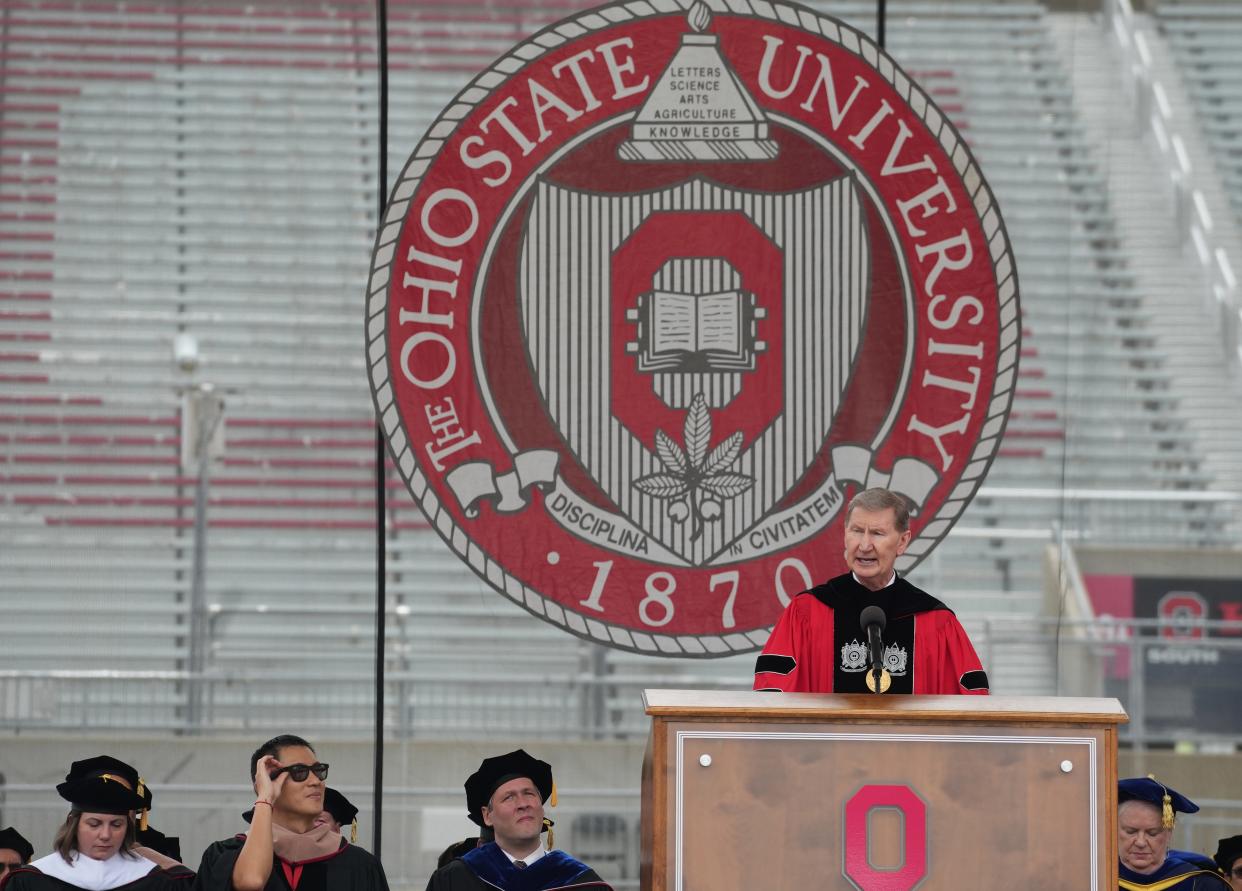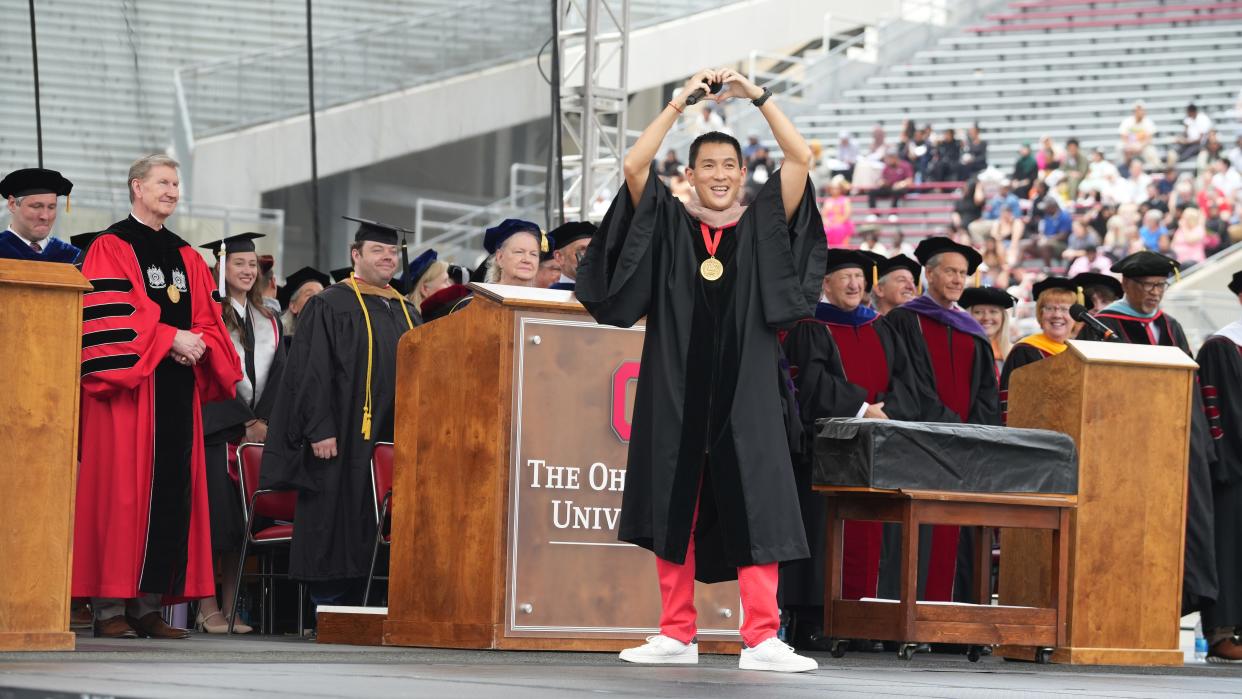Ohio State president responds to 'non-traditional' commencement speech, Bitcoin connections
Ohio State University President Ted Carter didn't review the speech of controversial commencement speaker Chris Pan, who drafted the speech while on psychedelics, included a pitch for Bitcoin and led a sing-along.
"That was certainly an interesting speech, I would say very non-traditional. There were some that liked it and a lot that didn't," Carter told reporters Wednesday following a hearing at the Ohio Statehouse.

Pan, a 1999 alumnus and social entrepreneur, and Carter share an interest in Bitcoin. Carter, who started as Ohio State's president in January, has served on Bitcoin miner TeraWulf, Inc.'s board since 2021. But he told reporters that the connection played no role in Pan's selection as commencement speaker. Carter said Pan was selected from a list of recommended speakers and had been considered for the role since 2019.
"There's absolutely no connection whatsoever," Carter said. "I'd never met him before. I did not know anything about him" until a dinner the night before commencement.

Pan posted on LinkedIn that he "got some help from AI (Ayahuasca Intelligence)," a psychedelic liquid, in crafting his commencement speech.
"Whatever drugs he did use, I hope they were prescribed," Carter said Wednesday. "I certainly wouldn't endorse that."
Carter said it would have been 'very inappropriate' to address death at commencement
Note: This story includes a discussion of suicide. If you or someone you know needs help, the national suicide and crisis lifeline in the U.S. is available by calling or texting 988. There is also an online chat at 988lifeline.org.
For many at the commencement, the speech was overshadowed by a tragic death.
Larissa Brady, 53, of Woodstock, Georgia, died after falling from Ohio Stadium in an apparent suicide, according to the Franklin County Coroner's Office.
Carter said he learned about the fall shortly before going on stage and chose not to mention it during the commencement.
"We didn't have all the information," said Carter, who offered his sympathies to the Brady family. "Out of respect for that family, who I knew was somehow connected to graduation, I thought it very inappropriate to say anything about it until we had more facts."

Campus protests: 'I'm actually proud of what the security forces had to endure'
Students across the nation have protested Israel's military actions in Gaza and called for universities to divest from Israel. About three dozen people were arrested at an April 25 demonstration on Ohio State University's campus.
Carter told reporters that he didn't want protesters to stay overnight − not because he thought they couldn't do so peacefully, but because Ohio State didn't have enough police to protect them. He reiterated the importance of free speech while commending police officers for how they handled the situation.
"I'm actually proud of what the security force had to endure to remove those tents," Carter said. "We didn't want to arrest anybody. We didn't want to go through any of that, but when it became apparent that they were going to go to whatever level they wanted to stay there, we had to use extra security forces."
Sen. Jerry Cirino, R-Kirtland, who leads the Senate Workforce and Higher Education Committee, commended Carter for his response to the protests, saying it should serve as an example to other universities nationwide.
Ohio Attorney General Dave Yost recently advised university presidents about an obscure law that makes it a felony to commit a crime with two or more people while wearing white caps, masks or other disguises. Carter said he hadn't heard of the law until Yost brought it to his attention.
"We'll take a look at it but we're not doing anything or taking any particular action out of it," Carter said.
Senators question DEI at Ohio State
Carter also answered lawmakers' questions about Ohio State University's diversity, equity and inclusion programs, which comprise 0.37% of the university's budget. Carter said that money goes toward compliance with federal Title IX programs, assistance for students with learning disabilities and culturally competent pediatric dental care.
"My commitment to you is that we will continue to serve students of all backgrounds and in all circumstances, whether urban or rural, first-generation, parenting students, veterans and more," Carter said.
The hearing comes as Ohio lawmakers consider Cirino's Senate Bill 83, a sweeping higher education overhaul that would ban mandatory diversity, equity and inclusion programs.
Other proposed changes would require annual faculty evaluations, mandate that course syllabuses be posted online, require an American government or American history class to graduate and add training for university trustees. The Ohio Senate passed the bill, 21-10, in May 2023, but it hasn't received a full House vote.
"We just don’t want to support programs that are divisive in nature," Cirino told Carter.
Carter said Ohio State University has a world-class faculty with diverse opinions already. He emphasized the importance of higher education as a path to a more informed citizenship − even as some lose faith in the value of universities for a variety of reasons.
"The simple truth of it is we're here to not tell students what to think but how to think," Carter said.
A $76.5 million ask
Ohio State University is asking lawmakers for $76.5 million for maintenance projects, including partial demolition of Evans Laboratory and other HVAC, elevator and fire system repairs. Founded in 1870, 48% of Ohio State’s buildings are at least 50 years old or older.
Legislators will vote on money for Ohio State and other projects in a capital budget in the coming weeks.
Dispatch reporters Sheridan Hendrix and Max Filby contributed to this article.
Jessie Balmert is a reporter for the USA TODAY Network Ohio Bureau, which serves the Columbus Dispatch, Cincinnati Enquirer, Akron Beacon Journal and 18 other affiliated news organizations across Ohio.
This article originally appeared on Cincinnati Enquirer: Ohio State president weighs in on commencement speech, protests, DEI
